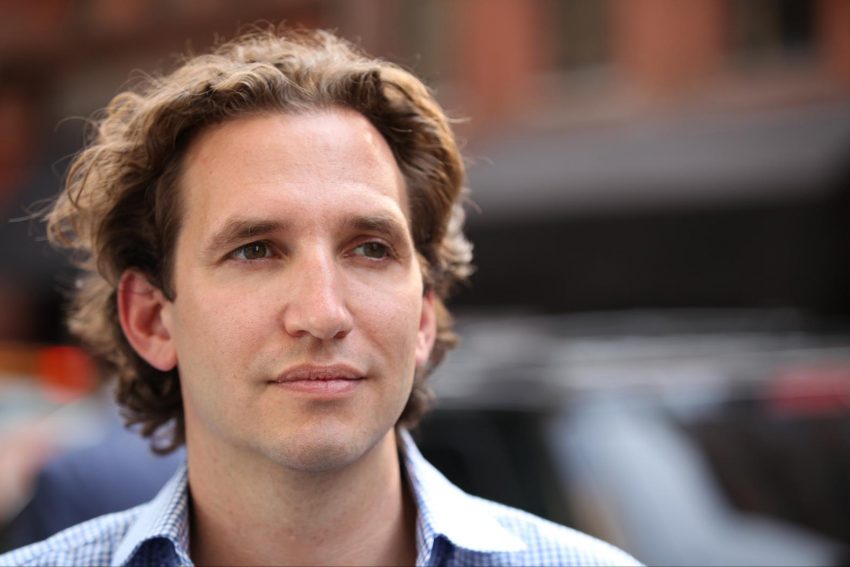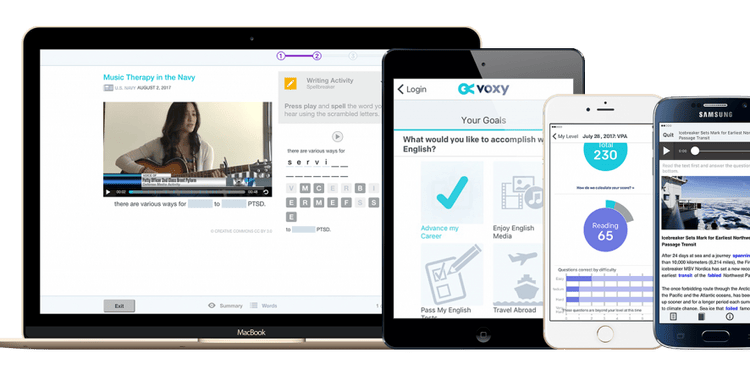While English may not be the most spoken language in the world, it is arguably the most influential and important. It pervades politics, finance and entertainment, and as such, a working knowledge of it is an incredibly valuable asset to have in your command. This has led to an incredibly large market for English literacy, with some estimates reaching $2.8 billion in 2015 for digital language learning tools alone, a figure that’s projected to reach $3.8 billion by 2020.
Anticipating this market opportunity, Paul Gollash founded Voxy, an English language acquisition app/computer program. Unlike traditional English language learning tools, Voxy provides its users with a personalized learning curriculum with the aid of real world content like news articles and menus. Voxy’s design has also been influenced by professional language learning research, provided by Ph.D. researchers. We interviewed Paul and asked him about Voxy’s unique content pool, pedagogical approach, and focus on task-based learning. This is what he had to say…
What was the original inspiration for Voxy?
I was previously a venture investor for Richard Branson’s Virgin Group. I helped build Virgin Hotels, I venture funded the hotel management company and raised a real estate private equity fund to acquire hotels, and I realized that that was going to take a long time. So I started looking for entrepreneurial options. One of the things I learned from Richard Branson was that you should definitely do something that is personally interesting to you, because starting companies from scratch is a lot of work.
So, I thought back on my own history, and when I was 22 I bought a plane ticket to Santiago, Chile. I didn’t speak a word of Spanish, but I managed to convince someone to give me a job working for him in an automotive parts warehouse. Funnily enough, I learned Spanish very quickly, and after about four months I spoke much better Spanish than a lot of my expat friends who had studied Spanish in school.
Fast forward 15 years from then, I thought back on that experience and how, by learning a language in a more relevant contextual fashion, I was able to accelerate my learning outcomes. I downloaded Rosetta Stone’s 10K at the time, their annual report which was publicly available, and it barely mentioned the word ‘Internet’. To place this into a wider context, it’s worth noting that Facebook had just come out with ‘newsfeed’ and Netflix was this big recommendation engine, so it was fairly clear that the ability to personalize media content was being enabled by technology. This made me wonder why you couldn’t use similar personalized, or what’s now adaptive, learning technologies to create a personalized curriculum for an individual language learner.

In the Photo: Paul Gollash, founder and CEO of Voxy. Photo Credit: Paul Gollash – about.me
There are other AI-based natural language processing, machine learning technologies, and software options like an Entity Extraction software out there in the market, so what helps make Voxy unique?
There are a couple of things that differentiate us in the market. As you said, it’s an extremely crowded space. There are no shortage of online and offline ways in which you can try to learn English. Truthfully that’s one of the enticing parts about the market opportunity, it’s bewilderingly fragmented. I mentioned the market size of about 100 billion dollars, and there’s really nobody that has more than a 1% market share, which is crazy.
What differentiates us is a couple of things. First, we create individualized learning pathways at scale through a patented technology which dynamically creates lessons from any piece of content that has text. It could be a video transcript from Bloomberg, articles from The Associated Press, or even a restaurant menu. We’ve developed some natural language processing technologies that allow us to convert anything that has text into a lesson. That gives us a huge differentiated offering in the market in terms of our breadth and depth of learning content. To put it in perspective, we have about 60,000 hours of content, and we can create about 1,000 new hours a month, whereas, your typical course would maybe have about 500 to 750 hours. Really an order of magnitude more content, and that allows us to create very tailored, almost bespoke learning pathways for our learners.
The second thing that differentiates us from most other competitors is that we have a fervent belief in our pedagogical approach. It’s called “task-based learning”, and the didactic science around second language acquisition has largely been ignored by the larger companies in this space, and we think that’s a real advantage. Our chief education officer, Dr. Katie Nielson, has a Ph.D. in second language acquisition, and she has been studying for decades the underlying principles and pedagogical foundation upon which we built Voxy.
I’d never thought about language learning as a “task-based” approach, that’s very interesting.
One of the things that our chief education officer, Katie Nielson, points out is that most schools’ approach to teaching second languages is much more similar to how they would teach any content area, like biology, chemistry or world history. But that is actually not very appropriate when learning a language. Learning a language is much more like learning a skill than it is a specific content area. So, we at Voxy think about learning English, or any second language, more like learning how to cook, how to surf, or learning how to shoot a free throw in basketball, starkly contrasting the typical ‘Week one – tenses. Week two – family members’ approach. Learning a language is learning a skill, and needs to be tied very closely with the real world tasks that you’re trying to accomplish.
 Photo Credit: Voxy.com
Photo Credit: Voxy.com
What impact has Voxy had on English learners? Have you been able to quantify it?
That’s a great question. One of the things that we did early on was to embed into our product an objective proficiency assessment tool, which can be mapped to all the global standards like TOEFL or the Common European Framework. We have, at this point, tens, if not hundreds of thousands of learners that have actually done pre and post-testing while they’re using our platform, so we’re able to get outstanding research that demonstrates how we can drive outcomes.
With regards to real world results, we’ve begun focusing on what we call “task-transfer studies”, and we work with our teachers and students to collect data on whether or not our students are able to accomplish their real world goals. We have hundreds and hundreds of learners that have sent us acceptance letters for jobs, transcripts from colleges and admission letters to Ph.D. programs where they needed to pass certain English standards. We are very, very proud of the fact that we are not just teaching people the English language for its own sake, but also really helping them accomplish the goals that they have in the real world.
Voxy is currently more targeted for business learners, are there any plans to expand coverage into other fields?
The content model that I alluded to earlier, which creates new learning content very easily in a scalable fashion, allows us to teach very hyper-tailored English. We don’t actually sell to individual consumers, we sell to corporations, HR departments in large global multinationals, and also to language schools. This being said, We are really laser focused on helping everyone, from teenagers all the way to adult learners, learn English that is relevant to helping them advance their professional and personal lives. It may look a lot like English language acquisition for business, but truthfully it’s delivered in schools as well. I think all of education is becoming more about employability. As the value of postsecondary degrees are in flux, people are focusing more on competency-based learning.
 In the Photo: Voxy on the web and on mobile. Photo Credit: Voxy.com
In the Photo: Voxy on the web and on mobile. Photo Credit: Voxy.com
What is in the future , do you think, for Voxy?
We are very proud of our pedagogy and our ability to deliver high-quality outcomes at scale. It’s still a massive market opportunity. In the future we see a few things changing. We see our personalization technology getting better and better as our algorithms improve and as our content library exponentially expands. We should be able to create better learning pathways that are much more efficient for English learners per unit of time spent.
Secondly, we pay close attention to the delivery mechanism. We were founded in 2010, therefore, we were obviously mobile-first. If you started a technology company in 2010 and you weren’t mobile-first, you were sort of missing the boat. But screen sizes have clearly changed, and broadband access on the handheld is now everywhere. Who knows what the next form factor will be, but advances in mixed realities can be observed, and we’ve paid a lot of attention to wearable technology. There will be an increasing number of ways that we’ll be able to take our learning engine and our ability to create learning pathways, and we’ll be able to deliver that to our learners in more and more device types and more and more interactive experiences.














